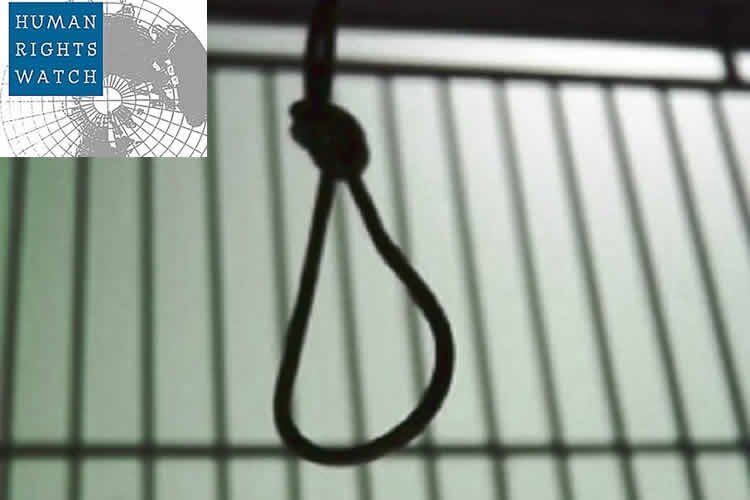(Beirut) – The Iranian government should immediately halt all executions for drug-related offenses while parliament debates amendments to reform the country’s drug law, Human Rights Watch said today. Parliament is expected to vote in two weeks on an amendment to the drug law that would drastically increase the bar for a mandatory death penalty sentence.
“It makes no sense for Iran’s judiciary to execute people now under a drug law that will likely bar such executions as early as next month,” said Sarah Leah Whitson, Middle East director at Human Rights Watch. “It would be the height of cruelty to execute someone today for a crime that would at worst get them a 30-year sentence when this law is amended.”
On July 16, 2017, parliament approved a proposal to amend Iran’s 1997 Law to Combat Drugs to limit the death penalty for some nonviolent, drug-related offenses. However, parliament sent the draft legislation back to the parliamentary judiciary commission for a fourth time to deliberate the proposed changes for certain offenses.
Under Iran’s current drug law, at least 10 offenses, including some that are nonviolent, are punishable by death, including possession of as little as 30 grams of synthetic drugs such as methamphetamines. The law also mandates the death penalty for trafficking, possession, or trade of more than five kilograms of opium or 30 grams of heroin; repeated offenses involving smaller amounts; or the manufacture of more than 50 grams of synthetic drugs.
On December 6, 2016, 146 members of parliament introduced a draft amendment that sought to replace capital punishment for drug offenses with imprisonment for up to 30 years, while allowing the death penalty if the accused or one of the participants in the crime used or carried weapons intending to use them against law enforcement agencies. The death penalty also would still apply to a leader of a drug trafficking cartel, anyone who used a child in drug trafficking, or anyone facing new drug-related charges who had previously been sentenced to execution or 15 years to life for drug-related offenses.
Under pressure from the judiciary and administration, however, the judiciary commission retracted part of their proposed amendments on July 9. It added the death penalty for nonviolent charges of “production, distribution, trafficking, and selling” of more than 100 kilograms of “traditional” drugs such as opium or two kilograms of synthetic drugs such as methamphetamines. The commission also restored the death penalty for possession, purchase, or concealing more than five kilograms of “synthetic drugs.” In both cases the death penalty would only apply where the accused had previously been sentenced to more than two years for drug-related offenses. On July 18, Hasan Noroozi, the commission’s spokesman, told IRNA news agency that the commission is adding “possession, purchase or concealing” 50 kilograms of “traditional” drugs to the offenses punishable by death.
On April 9, the commission proposed to apply the amendments retroactively, which would dramatically reduce the number of people currently on death row in Iran. In addition, on July 5, judiciary commission members asked the judiciary to suspend executions of drug offenders until parliament could vote on the bill.
A Human Rights Watch review of the Norway-based Iran Human Rights Organization’s database, which documents executions in Iran, shows that Ghezelhesar and Karaj Central prisons have not carried out any executions since the beginning of Ramadan on May 26, but that other prison authorities in Isfahan, Western Azerbaijan, Kurdistan, Sistan and Baluchestan, and Khorasan Razavi, have continued to execute people convicted of drug offenses. The group said that the authorities have executed at least 39 people since July 5 on drug-related charges.
In mid-July, Human Rights Watch interviewed via smartphone applications six family members of prisoners who are on death row. They said that they are hopeful that the new law would spare their loved ones from execution. The mother of a man executed in Khoram Abad prison in Lorestan province on June 24, said, “If authorities hadn’t executed my son today, [under the new law] he would have been sentenced to imprisonment.”
Iran has one the highest rates of executions in the world. According to Amnesty International, in 2016, Iran executed at least 567 people, the majority for drug-related convictions. In December 2016, Noroozi, the parliamentary judicial committee spokesman, urged parliament to amend the law, stating that 5,000 people are on Iran’s death row for drug-related offenses, the majority of them ages 20 to 30.
Human Rights Watch has repeatedly documented serious violations of due process, torture, and other violations of the rights of criminal suspects facing drug-related charges. Such flawed judicial proceedings heighten grave concerns about the application of the death penalty.
Under article 6(2) of the International Covenant on Civil and Political Rights, which Iran has ratified, countries that still retain capital punishment may apply the death penalty only for the “most serious crimes.” The United Nations Human Rights Committee, the independent expert body that interprets the covenant, has said that drug offenses are not among the “most serious crimes,” and that the use of the death penalty for such crimes violates international law. Human Rights Watch opposes capital punishment in all circumstances because it is inherently inhumane and irreversible.
“Parliament should resist any pressure to curb reforms to the drug law and move forward with a bill that better protects the right to life,” Whitson said. “This would be the first step in addressing the epidemic of executions in Iran and a move toward abolishing the death penalty.”







